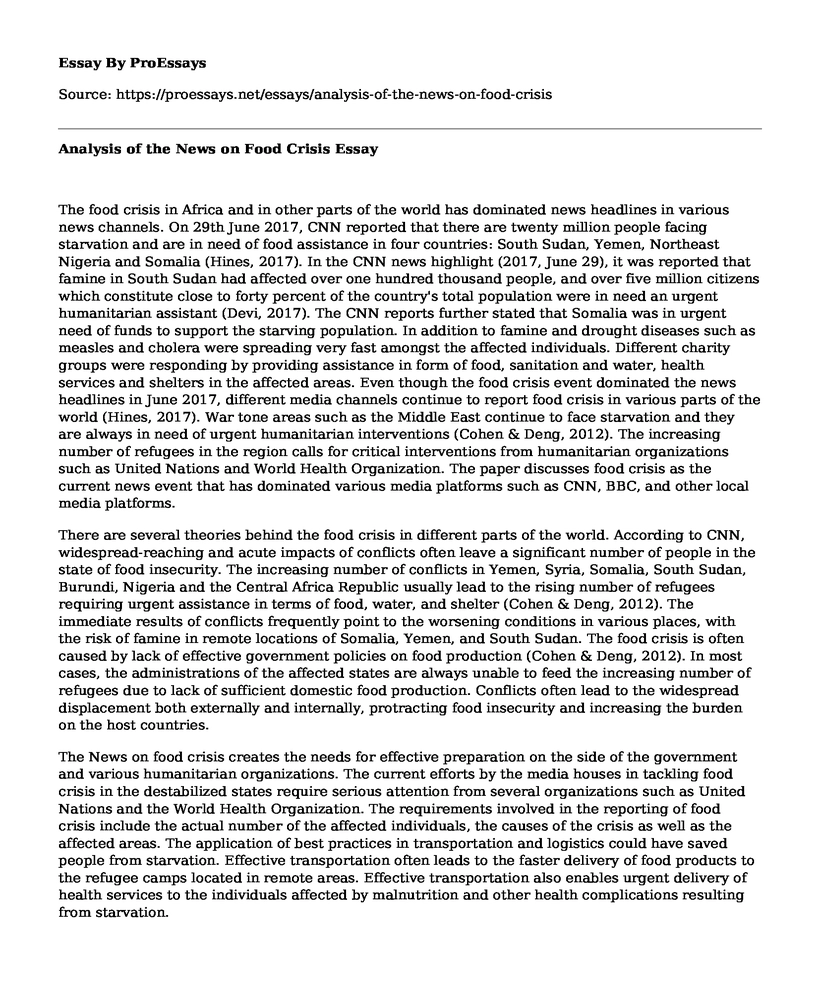The food crisis in Africa and in other parts of the world has dominated news headlines in various news channels. On 29th June 2017, CNN reported that there are twenty million people facing starvation and are in need of food assistance in four countries: South Sudan, Yemen, Northeast Nigeria and Somalia (Hines, 2017). In the CNN news highlight (2017, June 29), it was reported that famine in South Sudan had affected over one hundred thousand people, and over five million citizens which constitute close to forty percent of the country's total population were in need an urgent humanitarian assistant (Devi, 2017). The CNN reports further stated that Somalia was in urgent need of funds to support the starving population. In addition to famine and drought diseases such as measles and cholera were spreading very fast amongst the affected individuals. Different charity groups were responding by providing assistance in form of food, sanitation and water, health services and shelters in the affected areas. Even though the food crisis event dominated the news headlines in June 2017, different media channels continue to report food crisis in various parts of the world (Hines, 2017). War tone areas such as the Middle East continue to face starvation and they are always in need of urgent humanitarian interventions (Cohen & Deng, 2012). The increasing number of refugees in the region calls for critical interventions from humanitarian organizations such as United Nations and World Health Organization. The paper discusses food crisis as the current news event that has dominated various media platforms such as CNN, BBC, and other local media platforms.
There are several theories behind the food crisis in different parts of the world. According to CNN, widespread-reaching and acute impacts of conflicts often leave a significant number of people in the state of food insecurity. The increasing number of conflicts in Yemen, Syria, Somalia, South Sudan, Burundi, Nigeria and the Central Africa Republic usually lead to the rising number of refugees requiring urgent assistance in terms of food, water, and shelter (Cohen & Deng, 2012). The immediate results of conflicts frequently point to the worsening conditions in various places, with the risk of famine in remote locations of Somalia, Yemen, and South Sudan. The food crisis is often caused by lack of effective government policies on food production (Cohen & Deng, 2012). In most cases, the administrations of the affected states are always unable to feed the increasing number of refugees due to lack of sufficient domestic food production. Conflicts often lead to the widespread displacement both externally and internally, protracting food insecurity and increasing the burden on the host countries.
The News on food crisis creates the needs for effective preparation on the side of the government and various humanitarian organizations. The current efforts by the media houses in tackling food crisis in the destabilized states require serious attention from several organizations such as United Nations and the World Health Organization. The requirements involved in the reporting of food crisis include the actual number of the affected individuals, the causes of the crisis as well as the affected areas. The application of best practices in transportation and logistics could have saved people from starvation. Effective transportation often leads to the faster delivery of food products to the refugee camps located in remote areas. Effective transportation also enables urgent delivery of health services to the individuals affected by malnutrition and other health complications resulting from starvation.
References
Cohen, R., & Deng, F. M. (2012). Masses in flight: the global crisis of internal displacement. Brookings Institution Press.
Devi, S. (2017). Famine in South Sudan. Lancet, 389(10083), 1967-1970.
Hines, B. (2017, June 29). CNN. Retrieved from Help famine victims in Africa, Yemen: https://edition.cnn.com/2017/03/16/world/iyw-how-to-help-east-africa/index.html
Cite this page
Analysis of the News on Food Crisis. (2022, Mar 29). Retrieved from https://proessays.net/essays/analysis-of-the-news-on-food-crisis
If you are the original author of this essay and no longer wish to have it published on the ProEssays website, please click below to request its removal:
- Terrorism Descriptive Narrative
- Women History Month Activities - Essay Sample
- Essay Sample on Importance of Human Capital and Employee Engagement
- Uncovering the Causes of Limited Emotional Capacity in Kids - Essay Sample
- Essay on Kindred: A Black Visionary Heroine's Journey Through Slavery and White Supremacy
- Understanding Homelessness: Applying Point-In-Time Counts - Essay Sample
- Essay Example on Day at Domestic Violence Shelter: Compassion and Understanding







